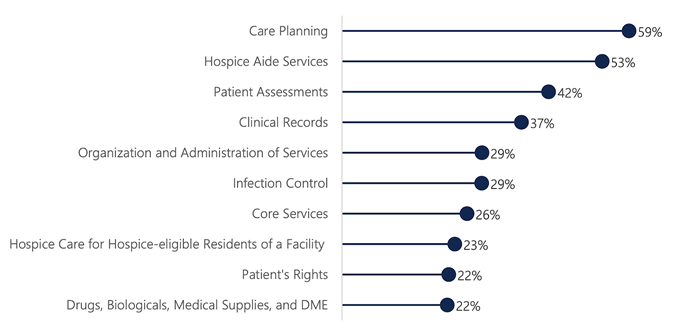The HHS Office of Inspector General recently analyzed complaint reports and other relevant data from 4,563 hospice care facilities around the country. Its findings were published in a report titled “Hospice Deficiencies Pose Risks to Medicare Beneficiaries.”
In the document, regulators concluded that there are “significant vulnerabilities” in the care provided to Medicare beneficiaries in need of palliative and end-of-life care. The Inspector General also published another report describing how substandard hospice care harms patients.
The picture painted by the report is rather grim. Terminally ill Medicare beneficiaries all over the country live in unsanitary conditions, are unprotected in the face of sexual misconduct, and endure pain and suffering due to untreated wounds. In many cases, poor conditions at hospices put patients’ lives at risk.
The Ten Most Common Hospice Care Deficiencies

Considering Medicare has been known to pay $17.8 billion to hospice care providers servicing 1.5 million beneficiaries in a single year (2017), tolerating 300 poor performers is unacceptable.
The report’s most shocking pages include references to an unnecessary leg amputation caused by failure to treat a patient’s wound, maggots developing around a feeding tube, and aides who failed to recognize clear signs of sexual assault. While the companies running the facilities received millions of dollars from Medicare, one patient suffered a broken leg due to staff neglect, and another one agonized with an untreated wound for two long years; the list goes on and on.
Conclusions of The Inspector General’s Report
The vast majority of hospices, the study found, “had at least one deficiency in the quality of care they provide.” Referencing data from 2012 through 2016, the report’s authors identified 50 serious deficiencies, including poor care planning, poor management of aides, errors in beneficiary assessment, failure to vet staff properly, and inadequate quality control.
- Over 80 percent of surveyed hospices had one or more deficiencies
- In the case of 20 percent of hospices, at least one of the observed deficiencies was serious
- More than 30 percent of hospices had complaints filed against them
- In half of the cases, these complaints were of a serious nature
- At least 300 hospices were categorized as poor performers
How to Address Hospice Care Deficiencies
The Inspector General’s report proposes a number of measures to protect beneficiaries and hold bad providers accountable, including:
- Expanding deficiency data reporting to the Centers for Medicare and Medicaid Services
- Including more comprehensive information about care deficiencies on Hospice Compare
- Educating providers to minimize practices that put patients at risk
- Expanding oversight for hospices with a record of severe deficiencies
While the government encourages witnesses and victims of abuse and neglect to contact Medicare’s hotline, whistleblowers must know that this can seriously reduce their chances of ensuring the case is investigated.
Under the False Claims Act, people with original information about Medicare fraud can receive between 10 and 30 percent of any resulting recovery. If you want to be taken seriously and increase your chances of receiving an award, you must contact a whistleblower attorney who can file a compelling fraud lawsuit on your behalf.